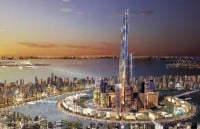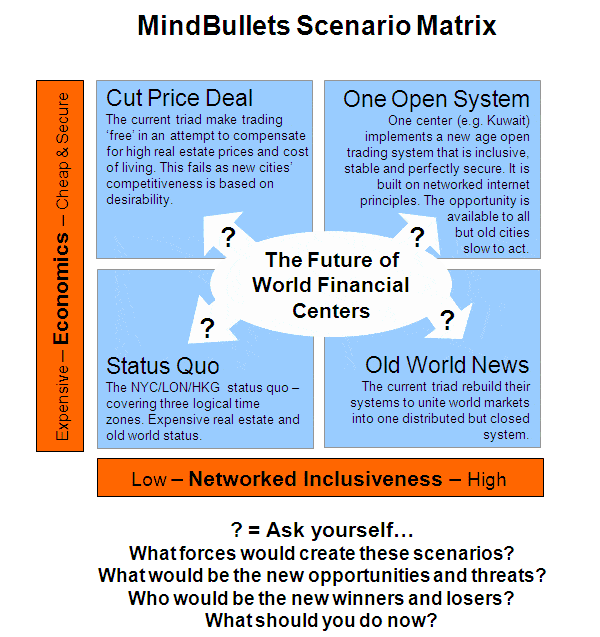
THE NEW ECONOMIC WAR: CITY VS CITY

Ugly battles for differentiation: Kuwait wins
- Dateline
- 14 January 2015
Hong Kong’s New Year celebrations were dampened by the news that Kuwait’s Silk City had topped the financial services league to become “The #1 Global Financial Center”. The mood in New York and London was as glum as the weather.
Over the past five years the banking and financial sector in Kuwait has evolved to global standards at a pace that would have been unthinkable in the early 2000s.
The focus has been centrally driven in the US$500 billion Silk City development, marginalizing the traditional role of New York, London and Hong Kong, and eroding their attractiveness for investors and workers.
Kuwait’s innovative open and distributed trading platforms seem to have been the straw that broke the financial camel’s back. A ‘global listing’ on Kuwait’s GSE is now far preferable to somewhat parochial ‘regional’ listings. Hong Kong, which was once #1 for Asian IPOs, has become absorbed into the GSE’s global gravity.
“Kuwait is a cheaper and friendlier place to do business,” says Alfred Chow, CEO of Standard Chartered Bank. “Their open trading platforms have made it so much easier to distribute our focus and balance our investments globally. We are moving many of our global support functions into our new Development Parks in Kuwait and Shanghai.”
In all news media, it’s bloody battles between cities that are hogging the economic headlines.
Qatar and Kuwait have usurped Dubai’s role as the centre of Middle East financial services and have become the UberCool destination for the young and wealthy.
St. Petersburg is becoming the focal point for northern European business. Singapore seems to have lost its will to win.
Real estate prices in New York, London, Singapore and Hong Kong continue to be extremely volatile.
ANALYSIS >> SYNTHESIS: How this scenario came to be
What is a City-state?
From Wikipedia, the free encyclopedia
A city-state is a region controlled exclusively by a city, usually having sovereignty. Historically, city-states have often been contingent of larger cultural areas, as in the city-states of ancient Greece (such as Athens, Sparta and Corinth), the Phoenician cities of Canaan (such as Tyre and Sidon), the Mayans of pre-Columbian Mesoamerica (including sites such as Chichen Itza and El Mirador), the central Asian cities along the Silk
The term “city-state” should not be confused with “independent city”, which refers to a city which is not administered as part of another local government area (eg, a county).
Today, Singapore, Monaco and the Vatican City are the only sovereign states which bear a resemblance to the classical definition of a city-state. Several sovereign countries do have self-governing areas delineated around cities, but these are not true city-states because they are not independent of the larger state. Typically a nation will have a federal administration from which the capital is granted a separate status. Examples include Washington (coterminous with the District of Columbia) in the United States, Brasília (coterminous with the Brazilian Federal District) in Brazil, Mexico City (being the Mexican Federal District) and Canberra (part of the Australian Capital Territory).
In nations without a federal administrative structure, capital cities sometimes enjoy a greater degree of autonomy, e.g. London. In Germany, Berlin has been a federal state (Land) of its own since 1990, but, unlike the above, remains inside the general administration of the country. (Note but this has nothing to do with its being the capital; the cities of Hamburg and Bremen have an identical status and look back on a much longer history of political independence.) A similar situation can be found in Austria, where the capital Vienna has the status of a state within the Austrian federation of states.
Yet another case is the Special Administrative Regions of the People’s Republic of China; Hong Kong and Macau. Neither capitals nor exclusively cities, their temporary, relative political independence results from agreements between China and the colonial powers that formerly controlled them.
March 2001: Shanghai vs Hong Kong
“Shanghai is increasingly seen as Hong Kong’s competitor. Even the HKSAR Chief Executive admits that Shanghai is formidable. Competition between the two will grow against the background of a more open mainland market as a result of China’s entry to the World Trade Organization.”
From the Hong Kong Trade Development Council (TDC) web site.
Sept’ber 2003: Hong Kong vs Singapore
“The rivalry, real or imagined, between Hong Kong and Singapore has gradually given way to a new one featuring Shanghai vs. Hong Kong.”
Y.C. Jao. The University of Hong Kong
May 2006: London vs New York
John Waples, Business Editor of the Sunday Times, sat down in his office with Jimmy Cayne, then chairman of Bear Stearns and riding high on Wall Street, who announced: “London is a nanosecond from overtaking New York as a world financial centre.” That’s how fragile city leadership can be, and how fragile business in the financial services industry really is. Quo Vadis Bear Stearns?
April 2007: More on Shanghai vs Hong Kong
The Vice President of the Shanghai Academy of Social Sciences:
“By 2010, Shanghai will have readjusted its industry structure, as Hong Kong did 20 years ago, from labor-intensive mode to modern service-oriented type, paying more attention to finance, shipping, communication and culture. There exists absolutely no concern regarding the marginalization of Hong Kong, even though confronted with competition from Shanghai, because China needs multiple metropolis.”
What does the ‘mayor’ of Shanghai think?
Jun/July 2008: Qatar and Kuwait vs Dubai, London vs The World
Several Sunday Times articles during June 2008 relish the new City vs City competition.
Qatar takes on Dubai to be capital of the Gulf. “The financier Stuart Pearce used to take a cab each morning to his windowless office in Mayfair where he would stare out over 150 traders surfing the wave of money that crashes over London each day. These days he can see real waves. His new office looks out over the sparkling waters of the Gulf that are studded with tankers so large they look like islands. At first glance, you might be forgiven for thinking that Pearce is the latest Briton to buy into Dubai’s desert dream of high returns and the high life. But this is not Dubai, or anywhere else in the United Arab Emirates. It’s Doha, capital of Qatar.” The Qatar Investment Authority has set up a vision that will make Qatar the ‘Switzerland of the Middle East’ – small, powerful – and very rich. “We’re learning from the mistakes of Dubai.”
A high-powered strategic thinking team has been drawn together by Boris Johnson, the new London mayor, to ensure the capital does not lose its status as a world financial centre.
The Guardian, 23 July 2008:
“Kuwait plans new US$132 billion metropolis: Silk City. The Kuwait Center for Strategic Studies: We’re thinking on a different plane because we cannot afford to think like everyone else. We’re going to out-maneuver everybody who remains in the old mode of thinking.”
The Evening Standard, 28 July 2008:
“US Banking Chief Bob Wigley of Merrill Lynch wants to help London Mayor Boris Johnson maintain London’s role as the centre of global finance.”
“London gives the go ahead for London cross-rail route – it signals a world city investing in its future competitiveness.” – Baroness Valentine
2012: Kuwait launches networked trading platform
In a bold move, Kuwait has become the first to embrace an open platform to host the world’s first truly networked trading system. The potential is for it to become the hub of global financial trading and is almost certainly part of its stated objective of becoming the world’s foremost financial centre.
2015: NY-London-HK dominance is shattered
Without much fanfare Kuwait has become the de facto standard for global financial trading.
Its open trading platform has quietly become the most attractive solution for corporate and retail trading. Due to the open networked nature of its design it has made New York, London and Hong Kong virtually irrelevant as Kuwait has allowed any computer using its standard interfaces to become an integral and real-time partner in its global network. Costs are down by an estimated 40%, security is massively enhanced due to the distributed nature of its network and data base designs and performance is “Spectacular!” in the words of one ex-NYSE trader. Kuwait has Amazon-ed and Google-d the traditional financial services players.
Real estate prices in the former triad of financial centers have stalled and are expected to plummet. The City of London has engaged McKinsey China in a desperate attempt to conceive a future without financial services at the center of its competitiveness.
2018: Kuwait beats Dubai
Qatar’s and Kuwait’s popular cities have usurped Dubai’s role in the Middle East after just ten years of amazing progress.
Suddenly Dubai is no longer cool. The financial scandals of the past five years tainted Dubai’s business climate and Qatar and Kuwait have become the antithesis of everything Dubai stood for.

Links to related stories
- Kuwait plans new £132bn metropolis - The Guardian, 23 July 2008
- Qatar takes on Dubai to be capital of Gulf - Sunday Times, 22 June 2008
- Boris Johnson asks City chiefs to maintain London’s edge - The Sunday Times, 22 June 2008
- Boris is right, London must stay in top tier - John Maples Agenda, Sunday Times, 22 June 2008
- Hong Kong v Shanghai: Global Rivals - BBC News, 27 June 2007
- London: Financial capital of the universe? - International Herald Tribune, 26 October 2006
Warning: Hazardous thinking at work
Despite appearances to the contrary, Futureworld cannot and does not predict the future. Our Mindbullets scenarios are fictitious and designed purely to explore possible futures, challenge and stimulate strategic thinking. Use these at your own risk. Any reference to actual people, entities or events is entirely allegorical. Copyright Futureworld International Limited. Reproduction or distribution permitted only with recognition of Copyright and the inclusion of this disclaimer.